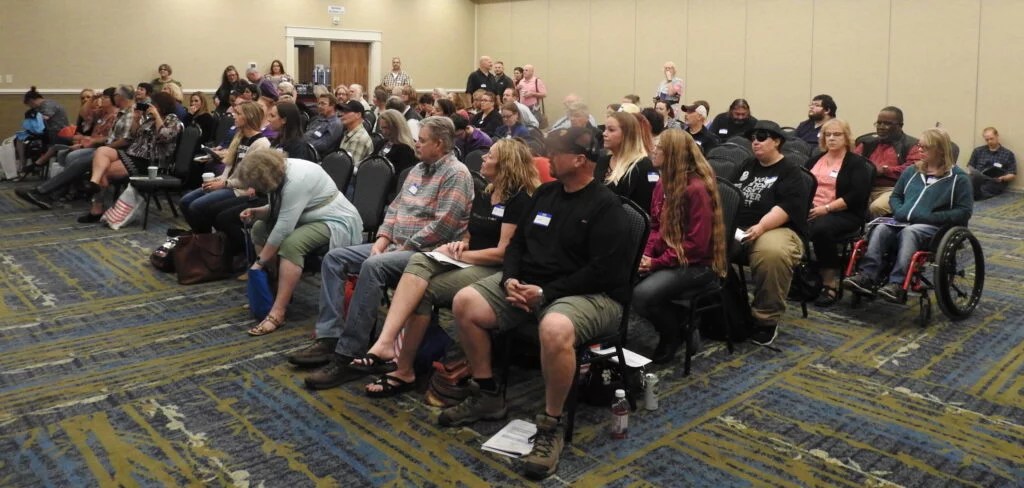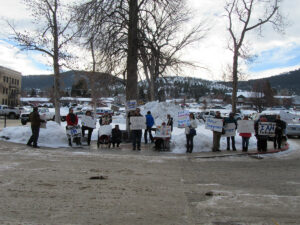We are a network of individuals who are on the path of recovery.
We identify as being in recovery from mental health, substance abuse and or addiction struggles. Together we share information, provide peer support, advocate with a united voice and improve the system. We come from places all across Montana, with different stories and experiences but together we make a difference. This is the Recovery Movement in Montana.


Realizing Recovery Blog
Recovery is Life
Recovery is the beginning of positive change and evolving into the spirit and human being an individual was meant to be. Its the bond and balance of body, mind, and soul. It is the discovery of who Creator really made an individual to be.
Relationships in Recovery
I believe that relationships are what gives each of our lives purpose. The connection that each of us have with the people in our lives is what gives us the ability have the emotions that we get to experience. I also believe that we get to have a relationship with ourselves.
Advocacy
Check out our new page dedicated to tracking state and federal bills, executive orders, and lawsuits.
 Standing up for what we believe is right, having a voice, making choices in recovery, and sharing our own recovery story are some of the things that make up advocacy and self-advocacy.
Standing up for what we believe is right, having a voice, making choices in recovery, and sharing our own recovery story are some of the things that make up advocacy and self-advocacy.
Let’s start with self-advocacy which refers to an individual’s ability to effectively communicate, convey, negotiate, or assert his/her own interests, desires, needs, or rights. It involves making informed decisions and taking responsibility for those decisions (Van Reusen et al., 1994).
Knowing yourself and your strengths, needs, and interests is the first step toward advocating for your rights. Once we begin to find our way on the path of recovery, we may want to begin to advocate for ourselves with those around us—peer supporters, friends, family, service providers, and doctors. These conversations may be difficult, but having them is vital to your recovery. Remember, you are the expert on yourself.
It may be that prior to getting on the path to recovery, others were making decisions for you or acting in what they believed to be your best interest. Now may be the time for you to let others know what you believe to be in your best interest. You may find yourself in the process of taking control and making decisions affecting your life and perhaps others’ lives. This process of self-determination means making informed choices, problem solving, setting and attaining goals—essentially being a self-advocate.
Advocacy or advocating for others may be something you are interested in doing. Advocating for another person isn’t about acting in a person’s perceived best interest, but it is standing with a person to ensure they are able to articulate and obtain what they want or need. Perhaps you may consider speaking up and advocating for various changes in the services in your community.
Here are a few examples of advocacy:
- Speak to your legislature or a special committee.
- Get involved with an advocacy group or organization.
- Share your recovery story to support others in recovery.
- Whether advocating for yourself, for others, for your community, or as part of an organization, advocacy is very self-empowering. You can make a real difference in your life, the lives of others, and even the community.
- Reach out to Montana’s Peer Network and share your recovery story on one of our “Recovery Talks” podcasts.
Advancing Advocacy Blog
Embracing Resilience: LGBTQ+ A Journey of Struggle and Triumph
In the tapestry of human history, the LGBTQ+ community has woven a thread of resilience, creativity, and love that stretches back centuries. Despite monumental progress in recent decades, LGBTQ+ individuals continue to face discrimination, adversity, and stigmatization. This blog aims to explore the intersection of LGBTQ+ history, mental health, addiction, and recovery, shedding light on the unique challenges faced by this community. As a lesbian woman in long-term recovery, who came out at the age of 37, I’ve witnessed firsthand the transformative power of acceptance, support, and inclusivity from many within recovery communities. Yet, like countless members of the LGBTQ+ community who have come before me, my journey has also been marked by moments of fear, judgment, and significant adversity. Embracing my authentic self has meant navigating a world that, at best, strongly favors heteronormativity, and at worst, as history has shown, can be hostile to individuals like me.
Service Work and Volunteering is Sacred
For most of my life, I didn’t put much time and effort into things unless it was self-fulfilling, of some sort. I always have had a big heart and loved to help feed, support, and be there in any way I could for family and loved ones, but past that, I didn’t do much that was out of my way of comfort, and added to my own status or towards a goal that was for my own selfish needs. As I grew older, I was taught that we do what we can for others, with boundaries. I wanted the acceptance of others and turned into a “Yes” person very early in recovery. I got sober in a program that believed in incentives. It taught me as an adult, that there was appreciation and meaning in going out of my comfort zone to help others.



